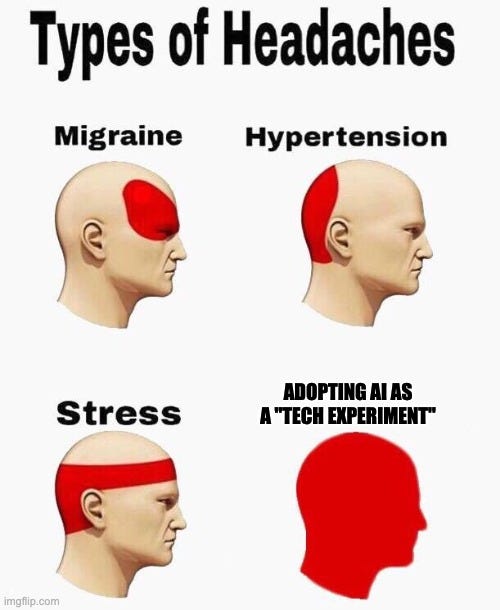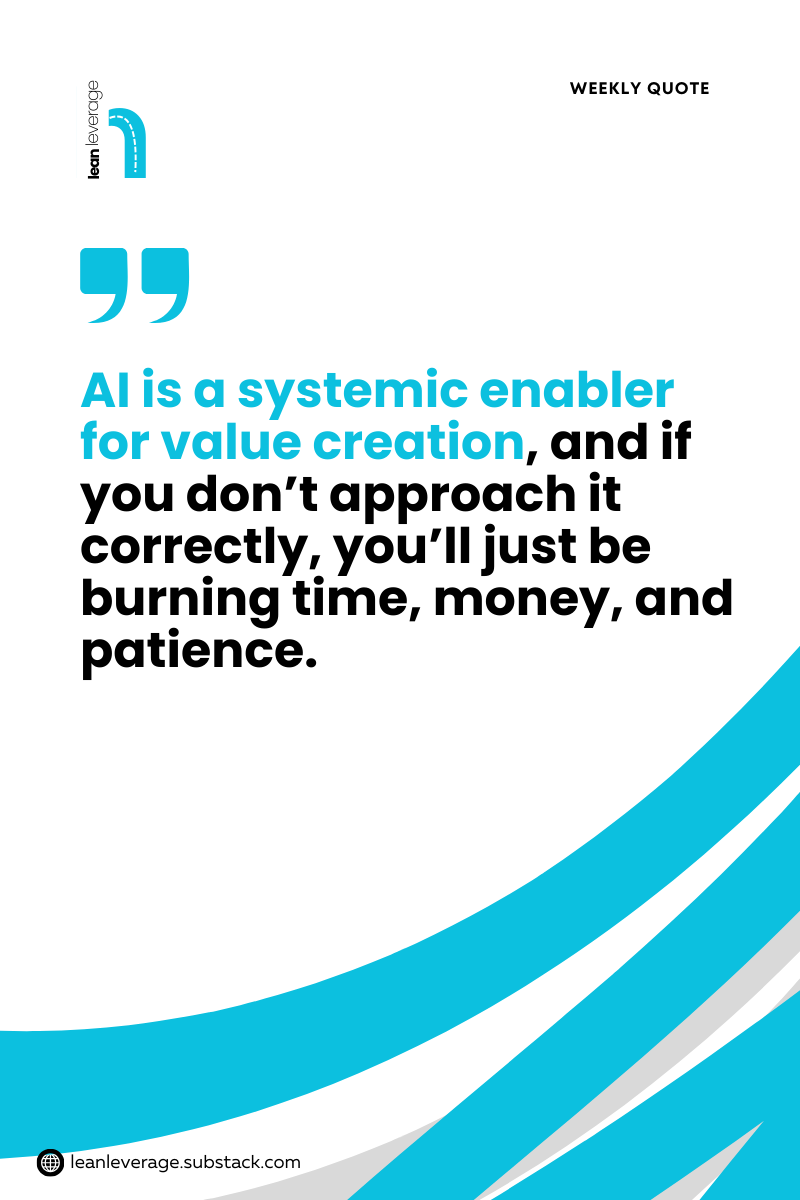Are You Even Ready for AI?
AI is a systemic enabler for value creation, and if you don’t approach it correctly, you’ll just be burning time, money, and patience.
Hey Friend,
AI is everywhere. If you’ve somehow missed it, congratulations—you’re probably living in a cave with no internet (must be peaceful).
The term Artificial Intelligence (AI) has been around for over 60 years, dating back to Alan Turing and his famous imitation game. But let’s be honest, for most people, AI wasn’t a big deal until ChatGPT blew up in 2022. Then came DeepSeek early this year, sending the stock market into a frenzy. Now, every company and their grandmother wants to jump on the AI train before it leaves the station.
And I get it—no one wants to be left behind. If you fail to keep up with the pace of change, the market won’t wait for you—the competition will move ahead, and customers will seek value elsewhere.
But before you start pouring money into AI projects and shouting “innovation” in board meetings, I have one simple question:
Are you even ready?
Because here’s the thing—adopting AI isn’t just a tech experiment. It’s not about slapping on a chatbot and calling it a day. AI is a systemic enabler for value creation, and if you don’t approach it correctly, you’ll just be burning time, money, and patience.
So before you jump in, let’s talk about three key things you need to consider before adopting AI for your business.
1. Do You Even Have an AI Strategy?
Look, just saying "We need AI" isn’t a strategy. That’s like saying “We need to go digital” without a clue about how or why.
A proper AI strategy aligns with your existing business goals, resources, and capabilities. It’s not just about getting AI—it’s about knowing why and how you’ll use it. Ask yourself:
Why are we adopting AI? (Cost reduction? Efficiency? Just FOMO?)
Where will AI be deployed? (Customer service? Operations? HR? Are you throwing AI at everything or just certain areas?)
How will AI be managed? (Do you have the infrastructure and talent in place?)
What does success look like? (Are there clear KPIs or metrics that would indicate that we are successful?)
Without clear answers, you’re not adopting AI—you’re just experimenting and hoping for the best. Vibes and Inshallah!
2. Do You Even Have the Basics in Place?
Some businesses want AI, but their foundation is a mess.
Let’s be real—if your systems are still struggling to talk to each other, if your customer data is scattered across ten different spreadsheets, or if your internet connection can’t even hold a Zoom call without buffering, then maybe—just maybe—AI isn’t your biggest priority right now.
Before AI can work, you need:
Structured, high-quality data (AI feeds on data. If yours is incomplete or messy, AI will only amplify the chaos.)
A solid tech infrastructure (Good internet, reliable servers, scalable cloud storage—basic things.)
Integration between systems (If you still have employees manually transferring data from one system to another, fix that first.)
AI isn’t a magic wand—it’s an amplifier. If your processes are already broken, AI will just make them fail faster.
3. Do You Even Have an AI Governance Structure?
Governance is not extra seasoning you sprinkle on AI at the last minute. It’s a core ingredient.
A solid AI governance framework ensures that AI is fair, transparent, and accountable. Otherwise, you’re setting yourself up for lawsuits, PR nightmares, or worse—unintended bias and discrimination.
Key things to think about:
Bias mitigation – AI can inherit human biases (e.g., biased hiring tools). What’s your plan to prevent this?
Transparency – If AI rejects a loan application, can you explain why?
Privacy – Are you handling customer data responsibly? Are you compliant with laws like GDPR?
Accountability – If AI makes a bad decision, who takes responsibility?
Risk management – What’s the plan for unintended consequences (like job displacement)?
If you don’t have clear answers, AI could cause more problems than it solves.
Final Thoughts: AI is Not a Quick Fix
AI is powerful, but it’s not “plug-and-play magic”. If you don’t approach it with the right strategy, infrastructure, and governance, it’ll drain your budget faster than sports betting.
This list isn’t exhaustive, but it’s a good starting point. Ask the tough questions before jumping into AI. Otherwise, you’ll just be spending money on a high-tech “headache”.
So, before you start, take a deep breath and ask yourself again:
Are you even ready for AI?
Also, after eight straight months of writing (with only one break in December), I’m taking a two-week breather. No new posts during that time, but feel free to revisit some of my previous ones—there’s plenty to chew on.
Until next time, keep improving!
See you in 2 weeks.
— Tomiwa
Lean Process Improvement Enthusiast






